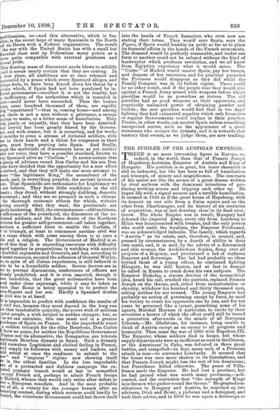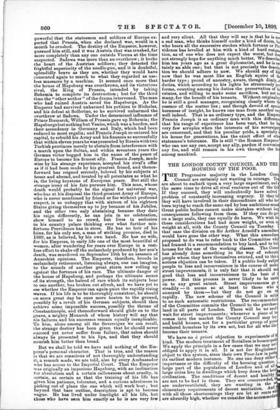THE JUBILEE OF THE AUSTRIAN EMPEROR. T HERE is no more
interesting figure in Europe, or, indeed, in the world, than that of Francis Joseph of Hapsburg-Lorraine, Emperor of Austria and King of Hungary. His position is so great, his inner character is still so unknown, his life has been so full of humiliation and triumph, of misery and magnificence. The contrasts of his career are like the scenes of a great drama written by rival authors with the dominant intentions of pro- ducing striking scenes and tripping each other up. He began life with a signal success and a terrible humiliation. It seemed in 1848 as if the great house of Hapsburg, with its descent on one side from a Swiss squire and on the other from Charlemagne, and its history of six centuries of acquisition, was at last drawing close to its final over- throw. The whole Empire was in revolt, Hungary had defeated the Imperial Army, every city from Lemberg to Milan was honeycombed with treason, and the only person who could unite the loyalists, the Emperor Ferdinand, was an acknowledged imbecile. The family, which regards " Austria " as its estate, met, therefore, in council, and, pressed by circumstances, by a dearth of ability in their own ranks, and, it is said, by the advice of a determined and able woman, the Archduchess Sophia, flung over all projects of a Regency, and proclaimed a lad of eighteen Emperor and Sovereign. The lad had probably no ideas beyond those of a young officer, he continued fighting Hungary, he was still beaten, and at last in despair he called in Russia to crush down his own subjects. The Emperor Nicholas, a sincere devotee of the monarchical idea, heard his call, crushed the patriots, replaced Francis Joseph on the throne, and, either from miscalculation or chivalry, withdrew his hundred and thirty thousand men, asking neither fee nor reward. The young Emperor had probably no notion of governing except by force, he used his victory to crush his opponents one by one, and for ten years he governed like a tyrant, permitting some of his agents, Marshal Haynan in particular, to excite by their severities a horror of which the effect could still be traced a generation afterwards in the minds of all European Liberals,—Mr. Gladstone, for instance, being unable to think of Austria except as an enemy to all progress and humanity. Then came the war of 1860 with Napoleon III. The Emperor, whose soldiers died in heaps, but whose supply departments were as inefficient as ours in the Crimea, or the Americans' in Cuba, was defeated in three great battles, and compelled—in fear, many said, of a Prussian attack in rear—to surrender Lombardy. It seemed that the house was once more shaken to its foundations, and that Francis Joseph might lose the rest of his dominions ; but Providence willed otherwise. The peace of Villa- franca made the Emperor. He had lost a province, but he had gained what was worth many provinces,—self- control, and the conviction that "the strength of Kings is in the men who gather round the throne." He gmatedcon- stitutions to Hungary and Austria, he snatched up two advisers! Deal: and Beust, a plebeian and a foreigner, and took their advice, and in 1866 he was again a Sovereign so powerful that the statesmen and soldiers of Europe ex- pected that Prussia, when she declared war, would in a month be crushed. The destiny of the Emperor, however, pursued him still, and it was Austria that was crushed, far more completely than any one outside Vienna at the time suspected. Sadowa was more than an overthrow ; it broke the heart of the Austrian soldiers ; they detected the frightful superiority of the needle-gun, and it is doubtful, splendidly brave as they are, whether they would have consented again to march to what they regarded as use- less massacre by a machine. It seemed once more that the house of Hapsburg was overthrown, and its victorious rival, the King of Prussia, intended by taking Bohemia to complete its destruction ; but for the third time the "other author " of the drama intervened. The man who had ruined Austria saved the Hapsburgs. As the Emperor had survived unharmed his petition to Nicholas, and his defeat at Solferino, so he survived unharmed the overthrow at Sadowa. Tinder the determined influence of Prince Bismarck, William of Prussia gave up Bohemia; the Hapsburgs lost nothing but Venice, which was a burden, and their ascendency in Germany and Italy, which had been reduced to mere regalia; and Francis Joseph re-entered his capital, to rebuild his Army and his finances so successfully that within eleven years he was presented by Russia with two Turkish provinces merely to abstain from interference with a march upon the Sultan, and within seventeen years the German victor begged him in the name of the peace of Europe to become his firmest ally. Francis Joseph, made wise by his strange experience, accepted his rival's offer as if it had been made by his greatest friend, and thence- forward has reigned serenely, beloved by his subjects at home and abroad, and treated by all potentates as what he is, the living keystone of European peace. But still the strange irony of his fate pursues him. This man, whose death would probably be the signal for universal war, who has at his disposal the third greatest Army of Europe, who is never mentioned by friend or foe without profound respect, is so unhappy that with sixteen of his eighteen States giving themselves up to joy because of his Jubilee, and the other two only abstaining because they date his reign differently, he can join in no celebration, show himself to no crowd, but lives in seclusion in his country palace thinking ever what further mis- fortune Providence has in store. He has no heir of his loins, for his only son, a man of striking promise, died in 1889, as is believed, by his own hand. He has no wife, for his Empress, in early life one of the most beautiful of women, after wandering for years over Europe in a rest- less effort to shake off the melancholy produced by her son's death, was murdered on September 10th by an assassin of Anarchist opinions. The Emperor, therefore, broods in melancholy retirement, listening always, one can imagine, to the sounds of another great storm now rolling up against the fortunes of his race. The ultimate danger of the house of Hapsburg, and perhaps the ultimate secret of its strength, the hatred of race which its subjects bear to one another, has broken out afresh, and we have yet to see whether the Emperor can again quiet the rapidly rising waves. If his life is to be thoroughly consistent, he should on some great day be once more beaten to the ground, possibly by a revolt of his German subjects, should then achieve some impossible success, possibly the throne of Constantinople, and thenceforward should glide on to the grave, a mighty Monarch of whom history will say that his failures and his successes remain equally inexplicable. To him, alone among all the Sovereigns we can recall, the strange destiny has been given that he should never succeed yet never suffer from failure, that ashes should always be presented to his lips, and that they should nourish him better than bread.
But we shall be told we have said nothing of the Em- peror's personal character. That is true, and the reason is that we are conscious of not thoroughly understanding it, a remark made, we are told, also by every Ambassador who has access to the Imperial Court. That the Emperor was originally an imperious Hapsburg, with an inclination for absolutism and a certain callousness about cruelty, is certain, as certain as that the training of his life has given him patience, tolerance, and a curious adroitness in picking out of plans the one which will work best ; but beyond that bare outline, description is apt to become vague. He has lived under limelight all his life, but those who have seen him exactly as he is are very few and very silent. All that they will say is that he is n, a sad man, who thinks himself under a kind of doom, I who bears all the successive strokes which fortune or p, vidence has levelled at him with a kind of hard resigr tion, as of one who does not expect the worst, but do not strongly hope for anything much better. We describ him ten years ago as a great diplomatist, and he is eE tainly an able one ; but that is not precisely the descri tion we should adhere to now. We should say of hi now that he was most like an English squire of t1 harder type ; proud of ancestry, aware, though dimly,, duties, which according to his lights he strenuously pe forms, counting among his duties the preservation of h estates, and willing to make some sacrifices, but not t{ many, for the benefit of his tenants. Without originalir be is still a good manager, recognising clearly where tk essence of the matter lies ; and though devoid of speci keenness of insight, he knows one man from another yea well indeed. That is an ordinary type, and the Enver( Francis Joseph is an ordinary man with this differeno that his range of experience has been -vast, that he ha very few scruples when the interests of his sovereigilt are concerned, and that his peculiar pride, a specialty a his house for generations, has the exact effect of othe statesmen's tolerance. He is still " the Roman Emperor' who can use any one, accept any ally, pardon if convenies any foe, and still remain in his own thought the firs among mankind.











































 Previous page
Previous page